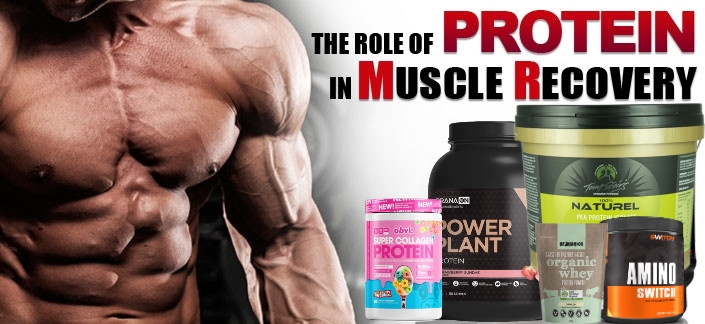The Role of Protein in Muscle Recovery.

A protein supplement is a part of any serious athlete's sports nutrition regime. This is because protein provides a serious dose of amino acids, which are the building blocks of muscles. In addition to promoting lean muscle growth, helping fat loss, boosting immune function and suppressing cravings, protein can play a crucial role in muscle recovery.
Is Protein Necessary for Muscle Recovery?
When you work out, especially if your routine involves resistance training, your muscles receive tiny amounts of damage at the fibrous level. This is a normal, healthy process and can only be seen in action with a microscope. It happens so that your muscles can re-grow with more strength and gradual increases in size.
Straight after training two processes are happening. One is this muscle breakdown; the other is protein synthesis, which is crucial to the development of new, more powerful muscles. At this time, commonly referred to as the 'anabolic window', your muscles are a bit like a sponge.
Not only are they craving energy for refuelling, they're also hungry for assistance in making repairs. This means that they're particularly receptive to protein absorption and ready to quickly take in any nutrients that you send their way.
Amino Acids
The reason that many athletes take protein supplements, in the form of powders and shakes, is that they provide a readily accessible and fast-absorbing source of protein. This is particularly true of whey, which skips the digestive process. It's a high-quality protein that's derived from milk during the cheese-making process, and is available in three forms - whey isolate, whey concentrate and whey hydrolysate.
Whey protein is taken straight into the gut from the bloodstream, so it can reach the muscles as soon as possible. Moreover, it contains high doses of both essential amino acids, including valine, leucine and isoleucine, the Branched Chain Amino Acids. One of the added bonuses of leucine is that it can also assist with suppressing the appetite and reducing cravings, as it's the substance responsible for telling your brain that you feel full.
When should you take protein for muscle recovery?
The length of the anabolic window varies from person to person. For some, it lasts an hour; for others, it's still happening after two. However, it's pretty hard to predict, so your best bet is to get your hands on a protein shake within thirty minutes of lifting your last weight.
This will help your body to make progress with muscle growth more quickly and effectively than it does with muscle breakdown, ultimately leading to a bigger, stronger and more toned and sculpted body. Any brand new muscle fibres are more efficiently synthesised, while fibres that already exist receive the bulking up effect of new strands of protein.
What's more, it's a good idea to combine your protein with carbs post-workout to stimulate the insulin response. This gives your body a much-needed energy source to assist with muscle repair, provides a more rapid delivery of nutrients to the muscle tissue and also helps to replenish glycogen levels, which are often depleted after training.
References
Annigan, Jan (ND), 'Does whey protein help you recover faster?', Healthy Eating, <http://healthyeating.sfgate.com/whey-protein-recover-faster-7396.html> accessed 12 April 2014.
Burke, Darren G. et al. (2011), 'The effect of whey protein supplementation With or without creatine monohydrate combined with resistance training on lean tissue mass and muscle strength', International Journal of Sport Nutrition and Exercise Metabolism, IJSNEM Whey with without creatine RT and LBM effects Burke 09-2001.pdf
Medical News Today (2013), 'What is whey protein?', Medical News Today, 29 October, <medicalnewstoday.com/articles/263371.php > accessed 12 April 2014.
Young, Kwon (ND), 'How do muscles grow?', University of New Mexico website, Go To Page accessed 12 April 2014.








